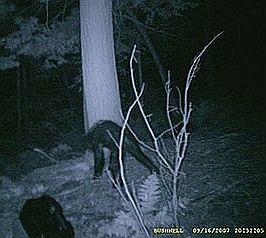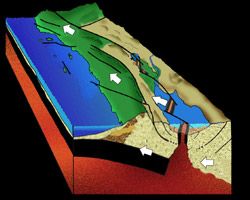
Publisher:
Bonnie King
CONTACT:
Newsroom@Salem-news.com
Advertising:
Adsales@Salem-news.com

~Truth~
~Justice~
~Peace~
TJP
Jan-22-2011 02:56

 TweetFollow @OregonNews
TweetFollow @OregonNews
The Mysteries of the Pleistocene
JD Adams Salem-News.comWhether Bigfoot is a species of giant ape or is descended from Gigantopithecus, remains to be seen...
 Gigantopithecus original source unknown Courtesy: University of Minnesota Duluth |
(SALEM, Ore.) - The Pleistocene Epoch spans a time from 2.6 million years ago to the end of the last Ice Age at 12,000 years Before Present. It is an immensely interesting period because of the existence of legendary, enigmatic creatures and people.
 This creature which many believe is likely |
We shall discuss the mysterious disappearance of the Pleistocene Megafauna, the changes wrought by Ice Ages, the massive Missoula Floods that scoured Oregon and Washington, how a meteor impact changed evolutionary history, and how the interaction of ancient human species with the towering Gigantopithecus, the largest primate ever to live on Earth, relates to our modern legend of Bigfoot.
Human history corresponds roughly to the Pleistocene and is known as the Paleolithic Era. It is initially characterized by the use of tools made of stone, wood, or bone, advancing to more complex tools used in agriculture.
The migration of humans out of Africa and into Asia, and subsequently into the North American continent, is thought to have been a contributing factor to the extinction of the large animals known as the Pleistocene Megafauna.
During the last Ice Age, the lowering of the sea level created the Bering Land Bridge between what is now Siberia and Alaska. Paleolithic hunters brought their skills and techniques over from Asia, confronting a world of mammoths and mastodons, saber-toothed cats, and the giant bear arctodus simus, the largest North American carnivore, standing over 11 ft. on their back legs.
Fossil jaw of Gigantopithecus blacki, an extinct primate |
These great beasts were examples of extreme adaptation, evolving exotic forms in the fertile land that lay south of the glaciers. During this time period, there is volcanic upheaval while glaciers recede and advance, shaping a constantly changing landscape of lakes and streams in valleys where giant bison and ground sloths grazed.
These variations in climate would have severely stressed the Megafauna by altering food sources and locations. On other continents, the timetable for extinctions was somewhat different, but ultimately resulted in the proliferation of the smaller, smarter, more versatile animals similar to what we see today.
Ice sheets covered large areas of the northern United States during the Pleistocene Epoch, including northern Washington, Idaho, and Montana. The release of an ice dam backing up a glacial lake flooded the Willamette Valley 400 feet deep!
The raging torrent swept down the Columbia River drainage, permanently altering the landscape in the most significant event of its kind ever recorded in geologic history.
Roughly 15,000 years ago, glacial ice grew southward into northern Idaho to block the Clark Fork River, creating 200-mile long Glacial Lake Missoula in western Montana. As the level of the lake increased, it eventually worked its way under and around the obstruction.
When the ice dam gave way, a flood of unimaginable fury hurled down the Columbia Basin, scouring the topsoil from large areas of Washington and moving boulders the size of houses, some of which were carried on floating ice for many miles and deposited as glacial erratics.
From: Plate Tectonics - Ocean Oasis Field GuidePleistocene Epoch to today, 2 million years to 0 million years
Great uplifting of Southern California and Baja California result in very high mountains to over 10,000 feet (3050 m). The northern portion of the Gulf of California is filled in with 20,000 feet (6 km) of sediment brought in by the Colorado River and surrounding land. Deep underneath the sediments, new oceanic crust continues to form from upwelling magma. Some of this magma melts into the thick sediments that fill the Northern Gulf, coming close enough to the present day surface to cause hot springs and other geothermal phenomena. Power companies in California and Baja California are tapping these hot spots to produce electrical power. |
The torrent slowed in the Portland area, depositing huge mounds of gravel and backing up into the Willamette Valley beyond where Eugene is today.
In Washington the Missoula Floods have sculpted an area known as the Channeled Scablands, containing stark canyons known as coulees, dry falls and numerous lakes. The damming and release of Glacial Lake Missoula occurred dozens of times over thousands of years as the ice sheet advanced.
The rich soil of the Willamette Valley is the result of this repeated flooding, much of it stripped from Washington.
A Paleo-Indian people known as the Clovis culture appears in the fossil record at the end of the last Ice Age. They are named for their characteristically fluted-shaped spear points, but archeologists do not agree whether it belongs to a single people or is a natural progression in weapon technology.
Also controversial are the origins of the Clovis. The prevailing theory ascribes a migration down the Pacific Coast, yet recent research has uncovered another, possibly parallel origin in Europe and a migration down the Atlantic coast. Further confounding the situation are the remnants of much older habitations being unearthed.
The Clovis people drop from the fossil record at the same time as the Pleistocene Megafauna upon which they subsisted. There is little doubt that the destiny of the Clovis people is intertwined with that of the Megafauna, either by virtue of over-hunting, or because of an impact event known as the Clovis Comet Hypothesis.
The theory is supported by the finding of a carbon-rich layer of charred soil at 50 Clovis-age sites in North America, along with substances usually associated with extraterrestrial objects, such as nanodiamonds, magnetic,carbon, and metallic spherules, along with iridium.
It's proposed that these materials are the result of a swarm of comets producing numerous airbursts and impacts on the surface north of the Great Lakes region. Although the theory remains controversial, a leading Clovis archeologist by the name of C. Vance Haynes is emphatic that "...something major happened at 10,900 B.P. that we have yet to understand."
Within the time frame of the Pleistocene emerges a genus of ape that dwarfs even the largest primates of today. The hulking creatures stood almost 10 feet tall, and weighed in excess of 1000 lbs. The first fossil evidence of the giant apes were molars an inch wide that turned up in a Chinese apothecary shop as 'dragon's teeth' in 1935.
Anthropologist Ralph von Koenigswald made the connection to the species and named it Gigantopithecus. The few fossils that have been found have come from China, Vietnam, and India, consisting of only a few jawbones and teeth. From the U-shape of the mandible, it was possible to ascertain that the windpipe could fit within the jaw like modern man, and so it was likely that the skull and spine were oriented upright, enabling bipedal locomotion, rather than on all fours like gorillas.
The Gigantopithecus lived during the time of primitive humans such as homo erectus, but was a plant eater. Some evidence suggests that homo erectus hunted the giant ape, and so given it's large cranial capacity and assumed intelligence, it could easily have developed strategies for avoiding humans.
Bigfoot researchers have grasped the significance of Gigantopithecus and it's similarity to humans, in terms of upright stature and intelligence. The ingrained avoidance of humans is possibly an instinct developed over thousands of years from the predation of homo erectus.
Whether Bigfoot is a species of giant ape or is descended from it remains to be seen, but the facts surrounding the fossil evidence of the giant ape have yielded some revelations relevant to the existence of Bigfoot.
Only scant fossil remains have been found of Gigantopithecus, but it's existence is undisputed, yet the lack of skeletal remains is often cited as a reason to be skeptical of Bigfoot.
Without the rare circumstances allowing fossils to be preserved, bones will be scavenged and decompose quickly in the forest habitat where Bigfoot has been observed. Combine that with the element of surprise in most sightings, the arrestingly humanoid appearance, the secretive habits of a rare, poorly understood creature, and the legend of Bigfoot is born.
- http://en.wikipedia.org/wiki/
Pleistocene_megafauna - http://en.wikipedia.org/wiki/
Paleolithic - http://en.wikipedia.org/wiki/
Missoula_Floods - http://en.wikipedia.org/wiki/
Clovis_culture - http://en.wikipedia.org/wiki/
Younger_Dryas_impact_event - http://en.wikipedia.org/wiki/
Gigantopithecus - http://www.bfro.net/ref/
theories/mjm/whatrtha.asp  J. D. Adams was born in Salem, Oregon, a descendant of Oregon Trail pioneer William Lysander Adams. As a wilderness explorer, photographer, and writer, he sustains a kinship with the spirit of the Oregon country. JD inhabits Oregon's Silicon Forest as an electronics professional with degrees in Electronics Engineering Technology and Microelectronics.
J. D. Adams was born in Salem, Oregon, a descendant of Oregon Trail pioneer William Lysander Adams. As a wilderness explorer, photographer, and writer, he sustains a kinship with the spirit of the Oregon country. JD inhabits Oregon's Silicon Forest as an electronics professional with degrees in Electronics Engineering Technology and Microelectronics.
- He maintains a Web presence with a signature presentation in genres including travel, history, and technology.
- You can write to Jim Adams at this email address: j1mcm0s@earthlink.net
- Also, visit Jim's Website: home.earthlink.net/~j1mcm0s/
Articles for January 21, 2011 | Articles for January 22, 2011 | Articles for January 23, 2011





Salem-News.com:
Terms of Service | Privacy Policy


All comments and messages are approved by people and self promotional links or unacceptable comments are denied.
JDA February 25, 2011 8:35 pm (Pacific time)
Jim, Thank you for the info on Meganthropus. I shall look into that, perhaps another article is needed to address these findings.
Jim February 14, 2011 11:38 pm (Pacific time)
The Meganthropus was a candidate for Bigfoot also. It was an ancient man, not a monkey. They used giant stone tools, and the jaws indicate they were of the Homo Erectine race. The jaws are 50% bigger,wider,taller than modern man, and the teeth also that much larger. Dr. Franz Weidenreich of the American museum of Natural History cautiously estimated that Meganthropus was about 1.5 times the size of a Gorilla, or roughly 600 lbs since a Gorilla weighs 400 lbs on average. Since Meganthropus was built like an Erectine, but at 600 lbs must have been around 8 to 10 feet tall if Weidenreich's estimate is correct, and I see no reason to doubt it. Other candidates for Bigfoot are the Homo Heidelberg race. This ancient race of Giants has been unearthed in the Transvaal, south Africa since the early 20th century. The bones of an ancient 8 foot tall man were found next to a giant extinct Buffalo with horns 12 feet accross in 1928 near Pretoria. These giants inhabited South Africa from half a million years ago until about 200,000 years ago. Professor Lee Berger of Witwatersrand University says these people were "truly giants." They found femurs and limb bones of such a size to indicate a routine stature of over 7 feet, and one femur was so big, "...It was beyond huge, they cound't even calculate the size of this individual" but Berger says it would have required a sort of NBA style person to even get into the sort of height range this giant must have been... "Something like over seven feet tall." Image of giant's femur: http://s8int.com/images9/naked%20giant.jpg
Jim February 14, 2011 11:24 pm (Pacific time)
Actually, I'm in favor of the Meganthropus Theory. The Meganthropus may have been 7 to 9 ft tall. But we don't have any limb bones say for sure. But Franze Weidenreich at the American Museum of Natural History in the 1940's believed it was 50% large than a Gorilla, so that's 600 lbs. If he was 400-600 lbs or thereabouts, and was built like a Homo Erectus, he had to be atleast 7 to 8 ft tall or taller. On the contrary giant bones of the femur, and limbs have been found in Transvaal and South Africa of Homo Heidelbergensis. prof. Lee Berger of Witwatersrand University says these giants were averaging over 7 feet tall. So these were archaic human giants 7-8 feet tall and hunted giant buffalo in the grass lands. Amazing stuff. There are lots of candidates out there for bigfoot.
JDA February 4, 2011 5:14 pm (Pacific time)
Dave, are you still out there? Recent events, which I am not yet at liberty to disclose, have given me pause to reflect on your last statement. Is there something you know that we don't? If you've had an experience that proves intelligence of a higher plane, let's hear it.
JDA February 1, 2011 3:42 pm (Pacific time)
Dave, You can't know that for a fact, but I agree that they may have evolved along a path where they can manipulate natural energy in a manner we can't comprehend. Read the Larry Kelm excerpt at the end of my Neanderthal story to see an example of these 'portal' type sightings. I keep an open mind about these things despite the reactions of those who are obviously frightened by anything beyond the mainstream.
Dave in Oregon January 28, 2011 11:40 am (Pacific time)
And thousands have seen them. What you left out and the crux of my point was that they are closer to us instead of Giganto or other giant species of Ape.
JDA January 24, 2011 11:28 am (Pacific time)
Humorous comment, considering millions of people haven't seen a sasquatch. If you read the story accurately, it leaves open the possibility that Bigfoot is a more intelligent descendant of Gigantopithecus.
Dave in Oregon January 23, 2011 9:30 pm (Pacific time)
The Giganto theory is a dead end theory that only found favor by those who had never seen a sasquatch and who couldn't accept them as something more intelligent and sentient. There is absolutely no evidence whatsoever to support sasquatch as Giganto.
[Return to Top]©2026 Salem-News.com. All opinions expressed in this article are those of the author and do not necessarily reflect those of Salem-News.com.